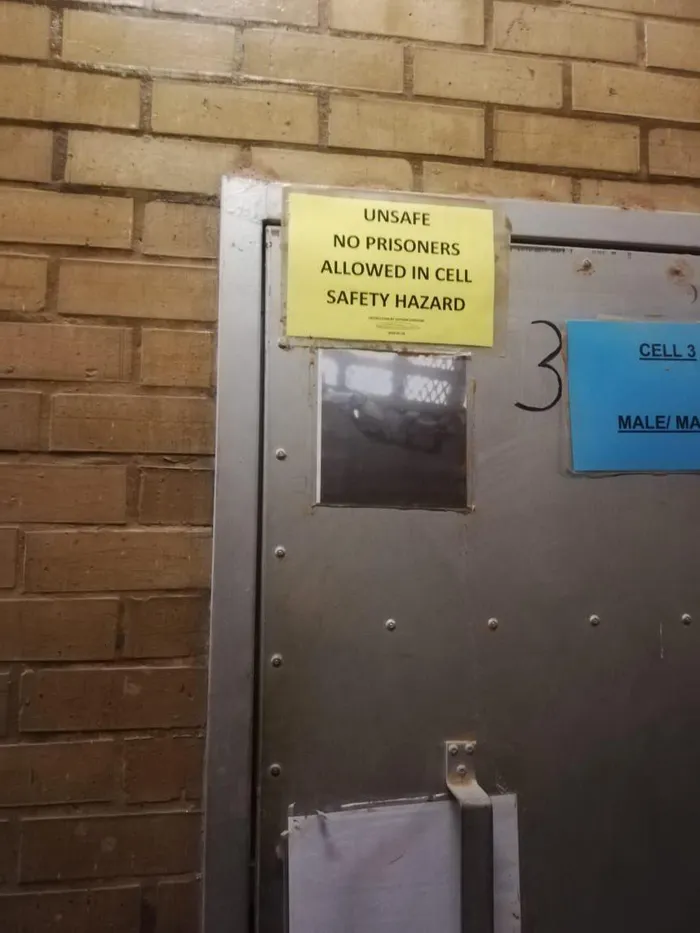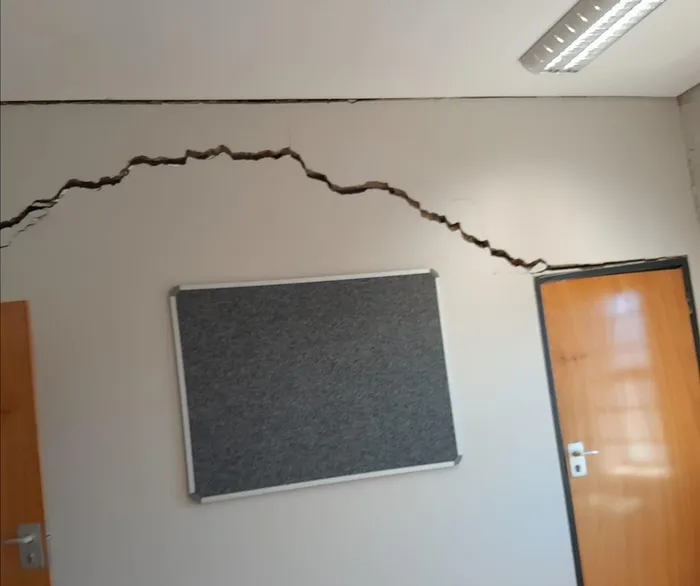
The collapsed police building which housed the police station’s charge office, public waiting room, administrative and safe custody areas, as well as archives - was declared unsafe.
Image: South African Human Rights Commission / X
A construction company is facing legal action after allegedly using inferior materials in the construction of a police station in Dysselsdorp, which subsequently collapsed.
The Western Cape High Court has ordered the company to provide the Department of Public Works and Infrastructure (DPWI) with documents necessary for the lawsuit.
Following a tender process, Reder Construction was appointed to construct a police station in Dysselsdorp in the Karoo for R39,468,931.99, but before completion of the project and handover of the site, one of the buildings collapsed.
The collapsed building housed the police station’s charge office, public waiting room, administrative and safe custody areas, as well as the archives.
The DPWI has taken the matter to court on grounds of breach of contract and wants further details from the construction companies for their trial preparation.

The South African Human Rights Commission (SAHRC) had an oversight visit to the collapsed building at Dysselsdorp police station in August last year. The SAHRC said the “station presented various infrastructure concerns”.
Image: South African Human Rights Commission / X
The department intends to sue the building contractor and structural engineer for damages in the sum of R9,795,220.02 arising from an alleged breach of contract.
They have sought, through their interlocutory application at the Western Cape High Court, that the company furnish them with materials used for the foundation of the collapsed building.
When contacted for comment, Reder Construction's legal counsel from Savage Jooste and Adams Attorneys, said “it is a procedural matter” and they are still studying the judgment.
DPWI spokesperson, Lennox Mabaso, said: “The trial is set to occur on a future date where the department is legally represented and the issues in dispute will be dealt with.”
According to DPWI, the building contractor and structural engineer for the project failed to use fill material of G5 quality in the sub-base of the surface-bed, and in doing so, they were negligent.
After the collapse of the building, the South African Human Rights Commission (SAHRC) conducted a site visit at the police station. During their oversight visit in August last year, the SAHRC said the “station presented various infrastructure concerns” and the building was “declared unsafe and no detainees may be kept in the detention cells”.
In their particulars of claim, the department alleges that Reder Construction caused the damages by defective workmanship due to inadequate compaction of the surface-bed and fill underlying the police station; and/or the use of defective construction materials, specifically, the use of subgrade filling material and the failure to “utilise fill of G5 quality in the surface bed”.
Acting Judge of the High Court, Fareed Moosa, said the information requested is necessary for trial preparation.
“I find that the applicant’s (DPWI) trial preparation is being seriously compromised by the refusal of the particulars concerned. Merely because evidence may be led thereon at trial does not disentitle the applicant to the information in advance of the trial.
“The averment that the material concerned has been pleaded is an acknowledgement of its relevance to the defences raised. The particulars are, in my view, truly necessary.
“The applicant’s preparation is compromised: its geotechnical expert is unable to conduct the necessary laboratory testing of the soil, nor are they able to formulate an opinion on the nature and quality of the fill allegedly authorised and used. This inability stems from the refusal to divulge information alleged to be exculpatory in the circumstances,” said Moosa.
The court ordered that the company shall furnish the DPWI with sufficient particulars that they have sought for trial preparation within 10 days of the order.
Cape Times